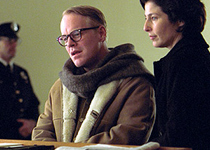"Ever since I was a child, folks have thought they had me
pegged, because of the way I am, the way I talk. And they're always
wrong."
In a magnificent turn, Philip Seymour Hoffman plays Capote, complete
with his fawning mannerisms and, more important, capturing that
shrill, high-tone voice. It is a performance of authentic characterisation
that mercifully avoided the stereotypical. The film, based on the
book Capote by Gerald Clarke, focuses on the way a writer
works on a story and how the story works on him, rather than restricting
to a formulaic bio-pic approach. The central subject splits into
two equal divides between a prescient character study of Capote
and an insider's look at a writer's methodology in creating one
of the prosodic masterpieces of twenth-century American literature:
In Cold Blood.
The film establishes early Capote as a celebrity writer (of Breakfast
at Tiffany's, among others), a popular guest on talk shows,
a man whose small stature, large ego and affectations of speech
and appearance make him an outsider wherever he goes.
Despite his non-conformist flamboyance and eccentricities, Capote
was able to enter a world far removed from the cosmopolitan that
is Manhattan and write a great book about ordinary Midwesterners
and two pathetic, heartless killers who massacred an entire farming
family.
One of these killers was Perry Smith (a sexy Clifton Collins Jr,
who incidentally played a gay assassin in Steven Soderberg's Oscar-winning
Traffic). Though the two men came from different spheres
of society, they sensed in each other a kindredship at first meeting:
Capote and Perry were both mistreated and passed around as children,
had issues with distant and remote mothers, had secret fantasies.
"It's like Perry and I grew up in the same house, and one day
he went out the back door and I went out the front," he tells
Harper Lee (played with a somber depth of feeling by Catherine Keener).
The film takes off from there to explore the relationship between
them: the writer and his subject. The catch is this: should Perry
not be convicted and sentenced to hanging, Capote's magnum opus
could never be completed or published.
First-time director Bennett Miller deftly paces his film, presenting
a succession of character-revealing scenes of Capote as his project
nears completion and as he subtly and slightly takes in more of
the alcohol that would eventually rule his life. But it doesn't
condemn him for his blinkered self-striving, either. Instead, the
film exhumes a figure obscured by notoriety and legend to discover
a fiercely ambitious, deeply lonely narcissist whose fractured personality
accommodated many, often contradictory, roles and whose greatest
asset turned out to be his greatest liability.
Capote possesses a thoroughly satisfying moral conundrum. It'll
hang you over till the next Oscar-worthy picture.

